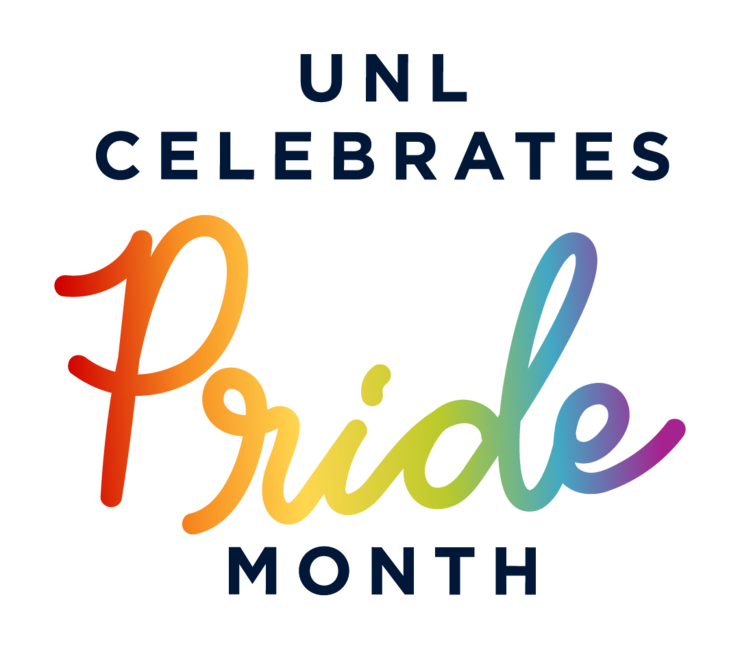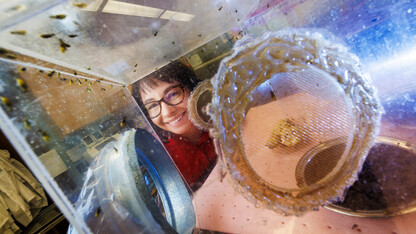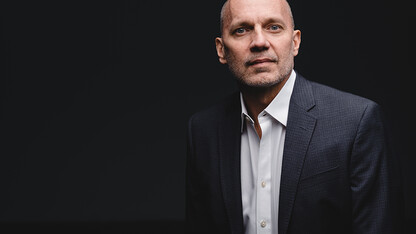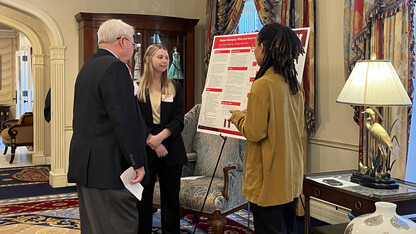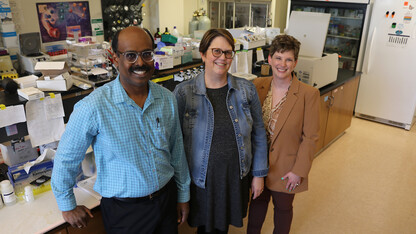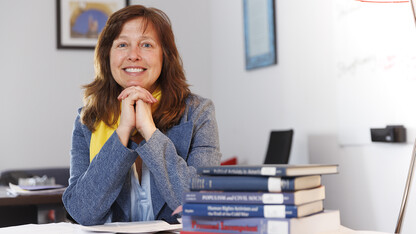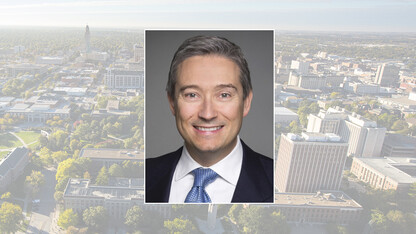· 7 min read
Huit aims to create welcoming spaces, support others
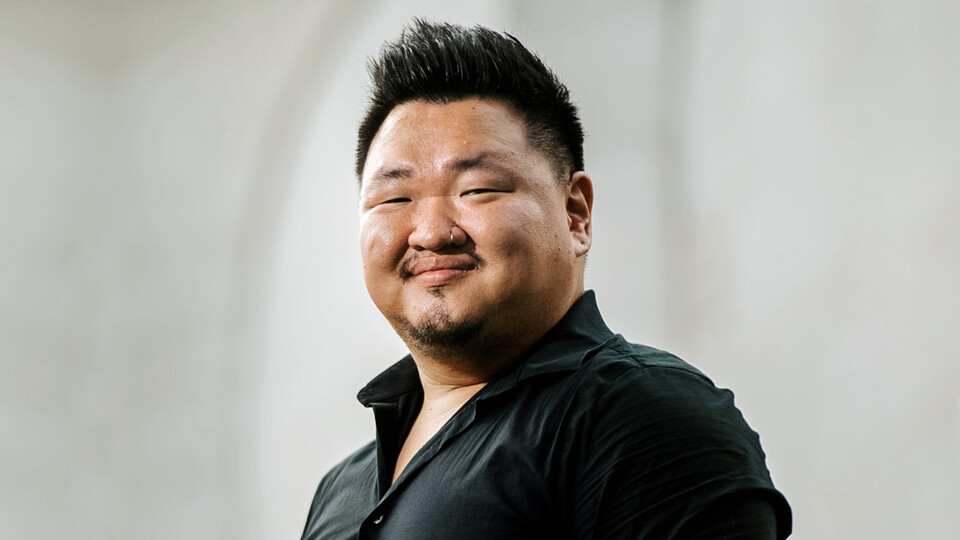
Editor’s Note — This Q&A is part of a weekly conversation series that is celebrating Pride Month on the University of Nebraska–Lincoln’s Medium page. The series will feature Huskers who are making impacts on campus and look to maintain that momentum in future careers.
For this week of Pride Month 2022, we’re talking with Zach Huit, a doctoral candidate in clinical psychology from Council Bluffs, Iowa. Through his work on campus, Huit is helping to foster welcoming spaces and support others.
What originally attracted you to psychology?
I loved the prospect of being able to work with kids and families in a way that was impactful and provided support for families who might not otherwise have those support systems in their lives. It was an opportunity to engage in creative problem-solving while also using my skill sets of empathy and understanding to help families realize their true potential.
Talk a little bit about your research on campus.
I have been very fortunate to be able to gain a breadth of experiences across different research domains. One of those experiences was working with Dr. Katy Holland, whose work focuses on experiences of sexual assault survivors, including LGBTQIA+ folx. One major focus of this work was understanding how university climate and policies impact the well-being of those who have unwanted sexual experiences and harassment.
Another facet of the research that I’m very passionate about is child maltreatment, namely the work that I have been able to do with Dr. David Hansen and Project SAFE (Sexual Abuse Family Education). This work has centered around the experiences of families who have survived child sexual abuse, including factors that contribute to their overall well-being and resiliency.
A final area of work that I’ve been very passionate about is with transgender and gender-diverse (TGD) communities with Trans Collaborations. Our community-based participatory work, under the direction of Dr. Debra Hope, centers around combating health disparities for TGD communities within the central Great Plains and other underserved regions of the United States. Through this work, as well as the opportunities to work with TGD youth in clinical and volunteer contexts, I have fostered my passion for doing research with TGD and queer youth as a facet of my future career.
You’re a member of the National Organization of Gay and Lesbian Scientists and Technical Professionals. Why are queer spaces like the UNL chapter so important?
Our local chapter, which is now known as Out to Innovate, was formed by Nicholas Harp and a few other graduate students in the psychology department. I was the former vice president of the organization, which has now been passed over to the next group of leaders who are doing great work! Our goal was to provide an affirming space for LGBTQIA+ graduate students in STEM-related fields, as there were no existing organizations geared toward graduate students specifically.
Having spaces like OTI is important for supporting members of queer communities who might otherwise feel disenfranchised within their respective areas of study. Our hope is that we would connect with other graduate students across campus in order to form a community of queer folks in academia. I think that it is important to have these safe spaces specifically for graduate students, who have to balance responsibilities as both students and professionals simultaneously. While there is a lot of great work that is happening through the LGBTQIA+ Resource Center to support queer students, there is a need to foster more community amongst graduate students, staff and faculty within the university. Through my connections with other students in the organization and my connection with the larger national organization, I have been able to connect with other queer professionals to understand the common challenges that queer people across vastly different scientific and educational disciplines face. Through these interactions, I have learned to embrace the commonalities and differences among a wide variety of LGBTQIA+ professionals and students.
When Lincoln hosted its first Pride parade in 2021, you talked about the importance of Pride festivals and parades (for queer people and allied individuals). Can you talk a little more about that?
I think that my previous statement about the importance of having those types of community events is even more important today, given the resurgence of discrimination against queer communities, especially among TGD individuals. I think that there is a beauty in having out, proud and visible queer people in community spaces, where those who are not as connected to queer social networks might find others who share similar identities and experiences. I think it’s highly important that we as a community have those events to come together, in order to provide the courage and strength to keep forging forward in the midst of a lot of tragic events going on in the country at the moment against queer freedoms and rights. Seeing places throughout Nebraska hosting their own Pride events feels almost like a beacon of light in the darkness. I think it is very encouraging to see more of Nebraska starting to host their own events and to build up that community presence in those spaces that have typically been less visible. I hope that trend continues into the future despite the broader context of the country at the moment.
What do you hope to accomplish in your lifetime?
That feels like a loaded question! I can’t foresee the future because I’m not a fortune teller, however, I would imagine myself growing into a career that focuses on supporting youth and families who have been marginalized and who have experienced adversity. For now, I see myself working within an academic medical center. In the future, I could see myself moving into a role where I am working more toward policy change or doing upper-level administrative work to shape the institution that I am working in to be more affirming and inclusive for all people. I am excited to continue to grow as both a person and as a professional. I am looking forward to where my career takes me, both in practice and in location.
Outside of work, I hope to one day get married and have a family, buy a house, travel, retire somewhere pretty. You know, the same dream that many have. As a gay man, I hope that one day this would not seem like a radical idea for queer people and that it would become a normal facet of human experience.
What or who inspires you?
I’m not one who generally gets starstruck by big names in any facet, whether that be in pop culture or within my profession. I find inspiration in interacting with people in my day-to-day life. Getting to know and to grow with those around me whether that’s my family, friends, or those in my professional life is one of the most rewarding gifts that I have the honor of experiencing. Those interactions are what keep me going and continue to push me forward. They are the things that remind me of why I do what I do. That support is tantamount to continuing to grow as a person. I have an amazing community of peers and mentors around me that continue to encourage me every day. That’s what inspires me.
What is your advice to other students looking to make an impact on campus and beyond?
My biggest piece of advice would be to educate yourself. Learn about those around you, learn about those with whom you’ve never interacted, and be open to new experiences that take you out of your comfort zone. Some of the most fruitful ways that you can make an impact are to diversify your bubble and to understand the experiences of those around you. It is this knowledge that will help you to understand how to make an impact whether that’s on a personal level, advocating for institutional changes, or fighting for change on a more global level. Connecting with others and sharing human experiences is crucial to enacting change.
Also, make sure to take care of yourselves and one another. A village is only as strong as the people who are a part of it, so make sure that you are attending to those in your life who are important to you, including yourself. Be loud, be proud, advocate for change, and be mindful of those around you. You never know what kind of ripple effect you can have on the world by being yourself and being there for others. Sometimes change doesn’t have to be as grand as you picture it. Start small and build outward.
